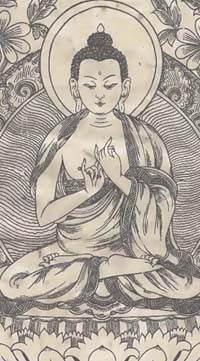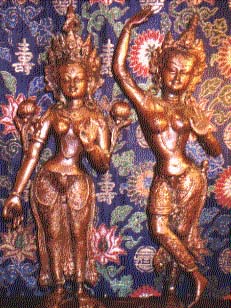Songs and Meditations of the Tibetan Dhyani Buddhas (original) (raw)
 Songs of the Shaktis of the Dhyani Buddhas, and their Bodhisattvas
Songs of the Shaktis of the Dhyani Buddhas, and their Bodhisattvas
This site focuses on the Tibetan Vajrayana Buddhist pantheon. Each of the beings named here represents a unique spiritual personality or essence. The principal beings are the five Dhyani Buddhas- the esoteric meditation Buddhas of the five colors found in The Tibetan Book of the Dead, Tibetan Buddhist iconography (temple statues and thangkas), and other sources.
These works may be seen as part of a long tradition of experiential poetry or_vajra songs_ which arise from the meditation of practitioners of Tibetan Buddhism. Milarepa and other lineage holders used contemplative writings or "songs" to convey their message and inspire their followers.
The contemplative poetry presented here evokes the thoughts and images of the beings of Vajrayana tradition often using the metaphor of music. Each poem can be looked at as a meditative exercise orvisualization designed to tune the reader to the state of mind or spiritual environment of the being that is speaking.
The point of view of each being is:
First, of a spiritual personality describing his or her essential nature
Second, of an actor describing his or her role in the Vajrayana tradition, and the spiritual environment in which action takes place
Third, of a spiritual guide giving advice to the seeker
The purpose is to introduce the spiritual seeker to elements of the Vajrayana Buddhist tradition outside the bounds of a particular lineage or school. When a Tibetan monk or nun is initiated into one of the older Vajrayana lineages, he or she is sometimes given a _Yidam_who serves as a spiritual guide, protector, and a focus of meditation. The practitioner does meditation to forge a strong link with this inner guide and teacher. One of the beings listed below is often chosen as a Yidam or guide for the initiate. This process is usually called guru yoga or deity yoga.
The Buddhist scholar Reginald Ray notes that most western Buddhists are basically "scientific materialists" and therefore cannot accept the concept of Yidams and other non-material beings as being of any special value on the path to enlightenment. However, Ray argues against this western view. We summarize his views in a discussion on the Value of Unseen Beings in Buddhist Ritual and Meditation page.
One function of Yidams or Buddhist guides is to inspire creativity, for they can serve as muses. However their traditional role is guide to the spiritual traveler who seeks knowledge of and access to the many inner worlds one may encounter during meditation. This kind of visionary experience is a stepping stone to the ultimate Buddhist goal of liberation from suffering (enlightenment).
The contemplative images here can serve as maps describing the geography of the inner spiritual worlds. They can also familiarize the reader with the values and ideals of Buddhism and the Tibetan tradition.
We hope that the material presented here will encourage an interest in Tantric Buddhist meditation and visualization, and make the infinite realms of Spirit more accessible to the seeker.
Enjoy the journey!
The Adi (Primordial) Buddhas
Vajrasattva - The Adi-Buddha of Diamond-light
Vajrasattva is the Buddha of diamond-wisdom, and is the chief Buddha of the five Dhyani Buddhas.
Vajradhara - The Adi-Buddha of Indestructible Blue Light
Vajradhara is the Adi-Buddha for both the Red-cap and Yellow-cap Vajrayana schools, as well as the lord of all mysteries and master of all secrets. Vajradhara, or he who holds the thunderbolt is said to conquer and subdue all evil spirits who are the enemies of Buddhism. He presides over the eight Dharmapalas who are the ferocious defenders of the dharma.
The Bodhisattvas (Emanations or Spiritual Sons) of the Dhyani Buddhas
Avalokiteshvara - The Spiritual Emanation of Amitabha
Amitabha's color is red. He is known as the Buddha of discriminating wisdom as well as the Buddha of infinite light. His bodhisattva or spiritual emanation is Avalokiteshvara, the bodhisattva of compassion or he who looks on the universe with the eyes of compassion.
Ratnapani - The Spiritual Emanation of Ratnasambhava
Ratnasambhava's color is yellow. He is the Buddha of the wisdom of harmony and equality. His bodhisattva is Ratnapani - the jewel-bearer who holds the_cintamani_ (wish-fulfilling gem).
Vajrapani - The Spiritual Emanation of Aksobhya
Aksobhya's color is blue. He is the Buddha of mirror-like wisdom and is known as the Immovable One. His bodhisattva is Vajrapani- the bearer of the thunderbolt (vajra).
Samantabhadra - The Spiritual Emanation of Vairocana
Vairocana's color is white. He is called the maker of perfect light. His spiritual emanation is Samantabhadra, the bodhisattva of universal kindness.
Visvapani - The Spiritual Emanation of Amoghasiddhi
Amoghasiddhi's color is green. He is the Buddha of all-accomplishing or all-perfecting wisdom. His bodhisattva is Visvapani, the double thunderbolt bearer.
The Spiritual Shaktis (Female Partners and Powers of Manifestation) of the Dhyani Buddhas
Mamaki - The Spiritual Shakti of Aksobhya
Locana - The Spiritual Shakti of Vairocana
Vajradhatvisvari - The Spiritual Shakti of Ratnasambhava
Pandara - The Spiritual Shakti of Amitabha
Maha Arya Tara - The Spiritual Shakti of Amoghasiddhi
The Dhyani (Esoteric or Meditation) Buddhas
The Dhyani Buddhas are distant and often require much ritual purification to contact. They are therefore difficult to communiate with during meditation. As a result, only one (Akshobya) currently has a writing associated with him.
Akshobya - The Dhyani Buddha of Mirror-like Blue Light
Vairocana - The Dhyani Buddha of Brilliant White Light
Amoghasiddhi - The Dhyani Buddha of All-accomplishing Green Light
Ratnasambhva - The Dhyani Buddha of Harmonious Golden Light
Amitabha - The Dhyani Buddha of the Red Light of Discriminating Wisdom
The Dakinis and Yoginis

Red Dakini - The Crimson Rose Skydancer
Black Dakini - The Dark Face of the Void
Blue Dakini - The Dancer on Ocean and Sky
White Dakini - The Snowflake of Shining Radiance
Golden Dakini - The Golden Waterfall of Peace and Blessings
Emerald Dakini - The Shining Green Star of Power
Vajrayogini - The Trauma Goddess
The Vajra Maidens
Vajramrita - The Essence of Flowing Nectar
Vajralasi - The Essence of Laughter and Wonder
Vajradhupa - The Essence of Clear Sweetness Amidst Clouds
Vajragiti - The Essence of Crystalline Song
The Bhairavas and Protectors
Vajra Bhairava - The Protector and Defender of Those on the Path
Mahabhairava - The Voice of the Silent Buddhas
Other Vajra Bodhisattvas
Vajragarbha - The Bodhisattva whose Fierce Essence is the Destruction of Illusion
Vajravarahi - The Essence of Abundance and Fertility
Manjusri - The Bodhisattva with the Sword of Discriminating Wisdom
Maitreya - The Coming Buddha
Sagaramati - The Bodhisattva whose Mind is like the Ocean
Blue Maitreya - On Friendship
Meditations on the Many Worlds of the Vajrayana Tradition
Prajnaparamita - A Meditation on the Goddess Of Transcendental Wisdom
The Vajra Dakini - A Meditation on the Paradise of Vajrabodhi Dakini
The Vajra Dakini - A Visit to the Dakini's World
Ritual Empowerment - A Meditation on Empowering a Statue of the Bodhisattva Maitreya
White Tara - A Meditation on Visiting the Land of the Yoginis
Maitreya - The Paradise Rider Meditation
The Vajrayogini - The Three Thrones Meditation
Green Tara - The Emerald Garden Paradise Meditation
Commentaries
The Vajra Dakini - Vajradhara and the Process of Emanation of the Dakini
The Vajra Dakini - On the Problem With Zen
The Vajra Dakini - The Geography of Death
The Vajra Dakini - Yidams or Spiritual Guides in Meditation and Dream Yoga
The Vajra Dakini - The Windows of the Mind
The Vajra Dakini - The Memory of Origins
The Vajra Dakini - Dakini Language
The Vajra Dakini - Institutional and Personal Roles
Green Tara - The Paradises of Purification and the Dangers of an Empty Self
Vajrayogini - The Door of the Soul
Vajrayogini - The Millions of Bardo Worlds
Vajrayogini - The River of Pain
Vajrayogini - The Buddhist Soul
Vajrayogini - The Ladders of Hell
Vajrayogini - Dealing with PTSD and Trauma
Vajrayogini - The Sambhogakaya
Vajrasattva - The Magnifying Glass of Purification
Maitreya - Shedding the Pain of One's Past
Maitreya - Beauty and Humor
Maitreya - The Sun Child
Maitreya - The Phoenix
Maitreya - The Road to Shangri-La
Maitreya - Maitreya's Colors
Maitreya - The Buddhist Paths of Fullness and Emptiness
Amida - Amida of the Ancestors
Green Tara - The Mountain Cave
Ratnapani - Institutional Versus Shamanistic Buddhism
Ratnapani - The Path to the Summit
Ratnapani - The Basecamps of the Buddhas
Additional Information:
For a more theoretical approach to this information which also contains additional meditations or sadhanas, visit theLostSadhanas.org website. It provides a more comprehensive view of Yidams and how the capacity to communicate with Yidams and obtain the sadhanas and guidance they provide has been lost in many modern forms of Tibetan Buddhism.
Home |Bodhisattvas |Shaktis |Adi-Buddhas |Dhyani Buddhas |Dakinis and Yoginis |Vajra Maidens |Meditations |Commentaries
This Web Site © Copyright 1999-2024, J. Denosky, All Rights Reserved
Author: Karma Gyurme Chodron